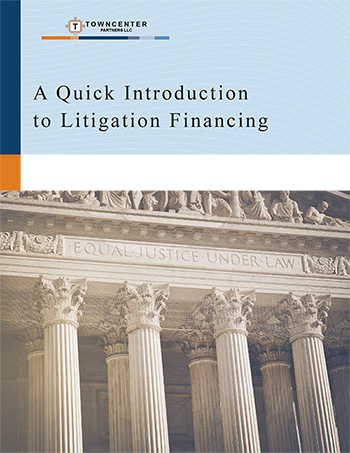Litigation Finance 101
Legal Financing Provides Financial Support When It Is Needed Most
TownCenter Partners, LLC provides “litigation financing” -- an opportunity for people who are part of a lawsuit to get immediate funds in exchange for a share of any eventual recovery. These funds often serve an essential need, providing money for litigation and other expenses so that lawsuits can go forward.
Legal Recognition and Acceptance of Litigation financing
Litigation financing is well established in countries such as the United Kingdom and Australia. While litigation financing is relatively new to the United States, since its introduction approximately 20 years ago it has rapidly expanded and statistics reflect that it is gaining widespread acceptance. A recent study reported that 36% of U.S. law firms used litigation finance in 2017, compared with only 7% in 2013.
The initial opposition to litigation financing in the United States was largely based on antiquated legal principles developed long before third-party financing. According to one article, “[t]he rise of litigation finance had legal scholars dusting off old textbooks to consider the application of principles such as champerty and maintenance."
Preserving Confidentiality of Litigation Financing Communications

Most federal courts which have considered whether communications with litigation funding entities are confidential have held that those materials are protected from the opposing party in litigation – finding that they are either immaterial, privileged, or protected by the work product doctrine. State courts are generally in agreement. Some courts have ordered litigation funding documents to be produced in discovery despite recognizing that the materials constituted work product, finding that the party seeking discovery had demonstrated a “substantial need” for the materials.
Courts are not uniform in this area however, and having an experienced and sophisticated litigation financing company involved is important. Conflicting authority exists in the federal courts, and at least one federal court has held that the common interest privilege does not apply to communications with litigation funding entities. Automatic disclosure of third-party litigation funding has been considered by the Advisory Committee on the Federal Rules of Civil Procedure since 2014, but as yet has not been adopted.
One notable opinion – addressing this issue comprehensively -- is Miller UK, Ltd. v. Caterpillar, Inc., 17 F. Supp. 3d 711 (N.D. Ill. 2014). After finding that litigation funding did not violate Illinois champerty or maintenance doctrines, the court addressed the discoverability of those documents, holding: (1) the “deal documents” between the company and the ultimately chosen funder were irrelevant and therefore not discoverable; (2) the company waived attorney-client privilege protection for any materials shared with “any actual or prospective funders” – rejecting the company’s common interest doctrine argument after concluding that “[a] shared rooting interest in the 'successful outcome of a case . . . is not a common legal interest”; and (3) the company also waived its separate work product protection for any work product that it shared with prospective funders – “except those with which it had a confidentiality agreement.” Id. at 730-732 (emphasis added). The court noted that “it appears that [the company] took protective measure with some but perhaps not all prospective funders." Id.
The Miller court provided additional guidance for protecting the confidentiality of communications with a third-party financer, finding that the work product doctrine applied to information given to prospective funders pursuant to written nondisclosure agreements and by oral “similar understandings”, although it remarked that the plaintiff’s declaration was “just barely” sufficient to show an adequate protection of the information from disclosure to adversaries. Id. at 737.
With respect to other communications, the court found that “there was no legal planning with third party funders to insure compliance with the law. . . . [Plaintiff] was looking for money from prospective funders, not legal advice or litigation strategies. . . . In short, the funders and Miller did not share a common legal interest, and materials shared with any actual or prospective funders lost whatever attorney-client privilege they might otherwise have enjoyed.” Id. at 732-33.
This issue continues to evolve, but existing authority suggests that communications regarding litigation financing are potentially privileged or subject to the work product doctrine, but the interested parties must diligently comply with the legal requirements to preserve that confidentiality.
Litigation financing may “enable parties who have meritorious claims to prosecute those claims more effectively because they have the wherewithal to do so and to make settlement decisions based less upon immediate need than the actual prospects of the litigation itself. . . . If anything, I think, by opening up an alternative source of capital for the litigation, it may actually improve the quality of litigation outcomes . . . .”
The Honorable Vaughn Richard Walker
Retired United States Judge for the Northern District of California




